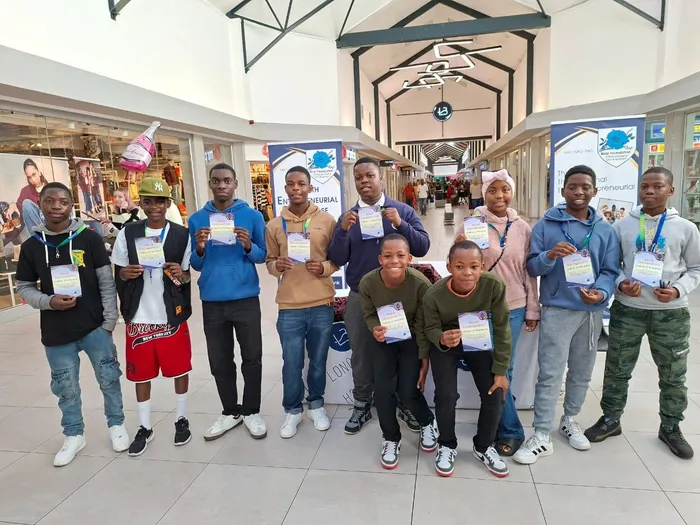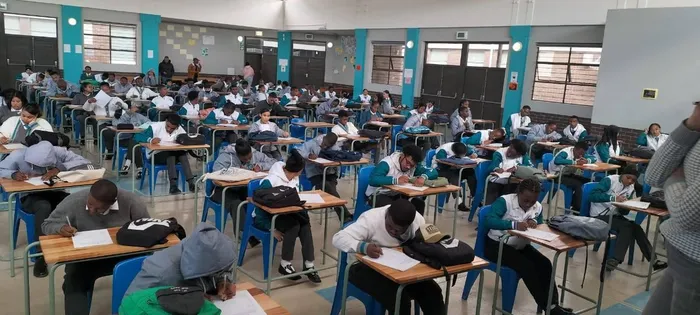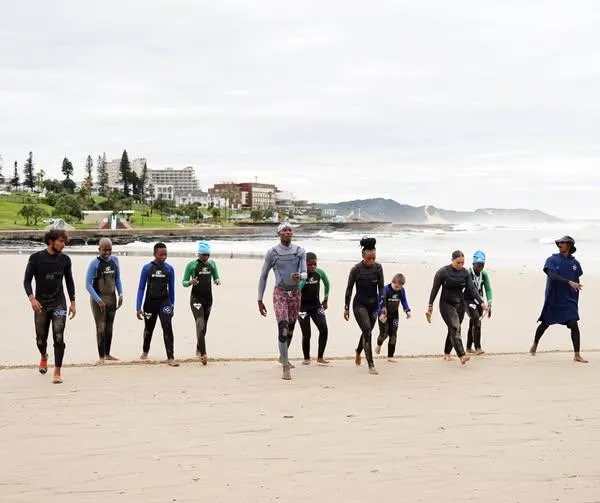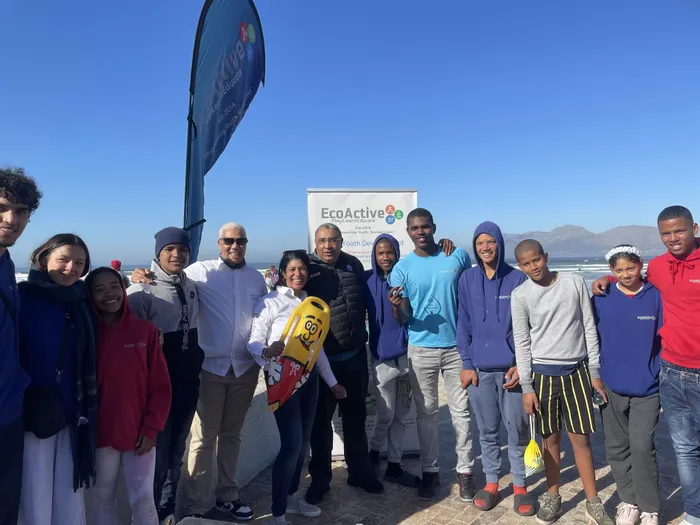Cape Town's grassroots initiatives combat youth unemployment crisis

The Briar Foundation, a non-profit organisation, hosted a Youth Entrepreneurial Showcase (YES) where pupils from schools across the far south and beyond presented their business ideas to a panel of judges.
Image: Supplied
With youth unemployment in South Africa alarmingly high - 45.5% for those aged 15 to 34, according to data from Statistics SA - the crisis facing young people goes far beyond the job market.
“Youth unemployment is for many youth like a death sentence,” said Frank Julie, a long-time youth development activist and founder of YoungPeople@Work.
“The dream of financial independence, following a career, starting a family, owning a home and generally adding value to society, is only an illusion, buried under false and recycled promises by politicians who only enrich themselves and their families.”
He added, “South Africa is the youth unemployment capital of the world. Over 60% of those classified as youth are unemployed. This is almost three times worse than during the Great Depression of the 1930s, when unemployment was 24.9%.”
Mr Julie warned that youth unemployment must be seen as a root cause of many social issues: “The descent into drug abuse, gangsterism, teenage pregnancies, and suicides - these must be viewed in this context.”
YoungPeople@Work focuses on breaking this cycle by providing practical tools and opportunities.

YoungPeople@Work is a member of the Early Intervention Team. Seen here is a successful early intervention outreach to Silversands High School by the Department of Employment and Labour. Students are guided and educated about the National Student Financial Aid Scheme(NSFAS) bursary applications.
Image: Supplied
The non-profit organisation offers mobile computer literacy training, WhatsApp-based life skills lessons, and help with CVs, bursaries, and job applications. Over the past year alone, it supported more than 20 000 young people online, with 480 receiving assistance to access bursaries.
Mr Julie believes real reform is urgently needed: “Stop the madness of limiting opportunities to under 35 years, Government must stop stealing from the poor and making empty promises.”
Several other grassroots organisations across the far south are similarly stepping up to create pathways out of hopelessness - through sport, therapy, education, mentorship, and leadership training.
At Waves for Change (W4C), surfing is being used as a tool for healing. The non-profit trains young adults to become surf coaches who deliver a structured, evidence-based Surf Therapy programme for children aged 10–14.
“Children and adolescents referred to our Surf Therapy programme are experiencing so much adversity,” said national director for Waves for Change, Robyn Cohen.
“At 10 to 14 years, many are witnessing shootings and stabbings, not having enough food at home, being approached by gangs, and being surrounded by gender-based violence.”

Waves For Change accepts referrals from Quintile 1 - 3 schools in the areas of their 5 beach sites as well as referrals from social workers, psychologists, hospitals and clinics. Once a year, they welcome children aged 10-13 years into their 10-month Surf Therapy programme, where they attend weekly sessions. Here, they learn to identify emotions, build confidence, develop self-regulation skills, and form healthy connections with peers and trusted adults while learning a new skill, surfing.
Image: Supplied
W4C supports formerly unemployed youth aged 18 to 25 years through its skills development programme, which includes first aid training, personal development plans, and mentorship.
Since its inception, W4C has trained 215 youth coaches. In 2025, 43 coaches are delivering surf therapy to 2 800 adolescents annually.
“We’re actively engaging with government partners to expand the training of caring coaches,” said Ms Cohen. “The goal is to create more youth-friendly spaces that promote mental well-being.”
Victor Thomas, director of the faith-based non-profit Living Hope, says empowering the youth is essential, especially as many face serious challenges like unemployment, drug use, and alcohol abuse.
“The youth are our future,” he says. “And we’re committed to helping them through life skills and support programmes.”
Unemployment remains one of the biggest challenges for young people, and Living Hope works to tackle this through a range of skills development initiatives.
These start as early as primary school, where their teams talk to learners about bullying, self-esteem, emotional intelligence, and soft skills.
They also support Early Childhood Development (ECD) by equipping teachers and working with moms and babies from birth to two years old, using reading and activities to boost early brain development.
“At every stage of a young person’s life, we try to respond with the right support,” said Mr Thomas.
Living Hope’s Life Skills programme reached more than 13 000 individuals this year.
Their afternoon and holiday clubs were attended over 67 000 times, and their ECD work impacted 1 657 children.
They also hosted their annual Dignity programme, which supports girls entering puberty by helping build self-awareness and confidence. Substance abuse is another concern, he said.
“We’ve strengthened our drug and alcohol programmes—not just in Muizenberg but in several high schools across the deep south,” said Mr Thomas. “We run support groups and engage young people directly, helping them make healthier choices.”
Living Hope also runs a job centre, which helped 2 811 people last year with job readiness and employment preparation.
Their agricultural training programme teaches young people how to become successful farmers, and they’re preparing to launch several new skills development projects.
The Briar Foundation, run by Irene Oxley, works with high school pupils to develop entrepreneurial thinking and confidence.
“Unemployment is a bleak reality,” Ms Oxley said, adding that jobs are shrinking, and competition is fierce.
"We must equip young people to think differently.”
Through annual workshops and youth entrepreneur showcases, the foundation reaches around
7 500 learners each year.
“Entrepreneurial thinking doesn’t just prepare you to start a business - it prepares you to survive and thrive,” she said.
Ms Oxley believes entrepreneurship should be included in the national school curriculum and that the government must work more closely with non-profits already doing the groundwork.
EcoActive runs community-based swimming and dropout prevention programmes, often reaching children who would otherwise not have access to basic water safety training.
“In our communities, learning to swim is still a privilege - yet it is a life skill,” said Belinda Minter, founder and CEO.
Through EcoActive’s positive youth development (PYD) initiative, high school pupils receive academic support, mentorship, and life skills training.

EcoActive was awarded the Bavo Verheyden Award for the best drowning prevention program. The organisation runs vital drowning and school dropout prevention programs, ensuring they can keep uplifting, upskilling, and empowering at-risk youth in the community.
Image: Supplied
“We’ve trained youth to become qualified lifeguards and created an environment where they can dream and set goals, and work towards those goals,” Ms Minter said.
While she acknowledged some government support, she said the need far outweighs available resources.
“There’s definitely room for stronger collaboration between government, schools, and grassroots organisations to create more sustainable, community-rooted solutions.”
She added: “We need greater investment in youth-focused initiatives, particularly in sport, mental health support, and education. Safe spaces, mentorship programmes, and access to resources like counselling and career guidance can make a massive difference.”
Whether it’s therapy in the waves, swimming lessons, mentoring, or showcasing youth-led businesses, these organisations are offering tangible support, structur,e and hope to young people.
Related Topics: